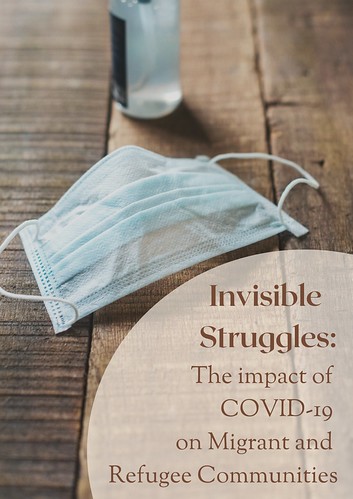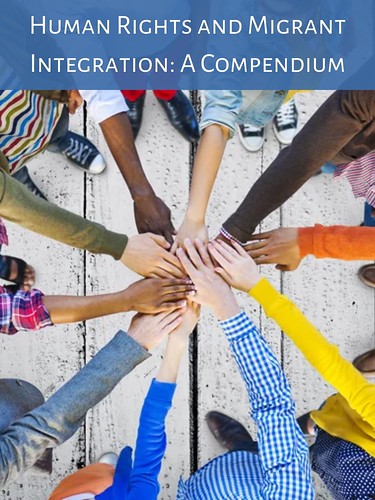The COVID-19 pandemic has brought unique challenges worldwide, affecting every aspect of society. One particularly vulnerable group facing many challenges were migrants and refugees as they began the complex experience of integrating into their new communities during unprecedented times.

Integration of migrants and refugees into their host country is important for fostering social cohesion and creating inclusive societies, as well as fulfilling their human rights. This also helps to break down barriers and promote social cohesion.
As mentioned in my previous articles, when New Scots are integrated in their host societies, they are more likely to protect the full spectrum of their human rights.
This article will explore the multifaceted impact the pandemic has had on the experience of migrants and refugees on integrating in Scottish communities, including educational disruptions, economic effects, health inequalities, and the responses from the government and support organisations during this time.

Social Connections and Loneliness
Connectivity and isolation seemed to be central factors to shaping their experiences of integrating during the pandemic. While lockdown restrictions accentuated the importance of digital connectivity and offered migrants and refugees the opportunity to have increased access to crucial information and services, the digital divide became much more apparent. Some migrants and refugees were without digital resources such as laptops, computers, tablets, or phones:
“So, at the time when the lockdown set in, I just had the mobile phone. We had no data, we had no internet and it was very difficult not only for me but especially for the children now that they are not in school. And I didn’t have anything to kind of keep them at least connected with the internet or something like that."
Because many migrants and refugees were facing barriers such as limited access to technology, language issues, or an unfamiliarity with online platforms and services, there was a large divide between those who were able to access online resources…and who weren’t.
Physical, social, and emotional isolation were experienced by migrants and refugees in Scotland during the pandemic. The imposed lockdowns disrupted traditional ways migrants and refugees would normally utilize when partaking in community engagement, language learning, and cultural integration.
“We have been through a hard time. We have been through a war, and then [through] the process of seeking asylum and later of settlement in this country. It was quite a tough process, and until now we are still settling, and then the lockdown started… In terms of lockdown, instead of going forwards, we were going backwards.”
Despite this, the work of government initiatives, community organisations, and NGOs in Scotland has had a positive impact on the integration process for migrants and refugees.
Acknowledging the need to mitigate social isolation allowed them to create more accessible services through offering virtual platforms, language, and cultural support. There was also an increase in virtual community building to allow migrants and refugees the opportunity to meet members of their community online and ease the physical separation the pandemic has caused.
The recent lived experiences of migrants and refugees underscores the importance of a comprehensive approach to integration during a pandemic, one which addresses both the digital and social aspects of connectivity.
The pandemic has also encouraged the promotion of cultural exchange, language learning, and mental health support to be both in person and virtual, in order to foster a sense of belonging and connection within one’s community. However, despite these efforts, it is important to note that that there must be aid provided to contribute to bridging a digital divide. This ensures that all migrants and refugees had equal access to the digital resources needed to use integration services provided through online platforms during and after the pandemic restrictions.
It is crucial for the Scottish Government and NGOs to recognise the interconnected nature of the pandemic’s social isolation when building an experience for migrants and refugees to build their new lives in their host community.

A State of Uncertainty
The COVID-19 pandemic introduced a state in-limbo for migrants and refugees in Scotland as they navigated the multifaceted process of integrating within their communities. The sudden introduction of lockdowns, travel restrictions, and closure of communities across Scotland had migrants and refugees becoming detached from support networks and integration opportunities.
The disruption of the integration progress caused migrants and refugees to experience acute distress, as services such as language classes, education, cultural training, and employment opportunities were interrupted. This has further caused New Scots to worry that they would fail to integrate or prolong their acculturation experience in becoming part of a community within their host country.
The experiences of the government’s pandemic restrictions caused migrants and refugees to feel like they were stuck in limbo, when all they wanted was to be recognised as part of their new Scottish communities.
A study was done by Queen Margaret University to set out a better understanding on the impact of the isolation measures brought on by the pandemic and how it impacted refugees. The study captured some experiences from participants who were interviewed; one response highlighted the difficulties faced during this tough time for integration:
"I came here in mid-March. There is nothing there to do, all the time in the [hotel] room, the only thing is to be on the mobile phone. There is the room and then when you go downstairs, there is not much. I mean nothing else. Everyone is just staying in their rooms, wearing masks. I have not been able to make friends or meet people. I was bored and called my family just to share something and then we hear what they are going through and it is much more than coronavirus and we can’t even talk about what we are going through. Here corona kill people but there the people kill each other. Mentally I am very tired. I feel everything is dead."
This example of the lived experience of one refugee showcases how tough it was for them to integrate during a time of uncertainty, with limited access to support services. This in-limbo experience for refugees during the pandemic created a prolonged period of waiting and adaptation. This is mainly due to the fact that services took some time to adapt to becoming available online, as well as ensuring all New Scots had the required digital resources for migrant integrating resources during the pandemic.
On top of the stress of learning a different language, understanding a different culture, and being accepted by their new community, migrants and refugees were also burdened with the worries of ever-changing restrictions, and of becoming sick from COVID-19.
As migrants and refugees in Scotland grappled with the ongoing effects of the pandemic, the Scottish government, local governments, and NGOs had to play a large role in recognising what was needed to break the in-limbo state many were in while trying to integrate. During the pandemic, it was crucial to have tailored support services and technology provided to individuals so that they had opportunities to integrate within their communities during uncertain, isolated times.

Providing Integration Support during the Pandemic
Integration support services in Scotland during the COVID-19 pandemic were essential for migrants and refugees to tackle their unique challenges faced when integrating during lockdowns and restrictions.
Here are my suggestions for key integration support services which would have been helpful to migrants and refugees when trying to integrate into Scottish life during these unprecedented times:
1. Online Language Learning Programmes
Language proficiency is the main component for successful cultural integration. Due to lockdown restrictions, language learning classes were no longer as accessible in person as they used to be. In response to these limitations, the promotion of virtual classes, language apps, and digital resources could have enabled migrants and refugees to continue their language education. Better communication allows for more opportunities for integration into local communities, both virtually and in person.
With better language proficiency, migrants and refugees would have been able to access further services provided by the Scottish government, local authorities, and NGOs.
2. Information Distribution Campaigns in Multiple Languages
During the pandemic, it was important for the Scottish government, local authorities, and NGOs to recognise the significance of clear and accessible information. Although language learning programmes should be provided online to migrants and refugees, it is still important to acknowledge that content must be accessible in almost all languages for individuals who are not entirely proficient in English. Launching information campaigns in multiple languages would have insured that migrant and refugees were well-informed about integration support services and changes to COVID-19 restrictions.
3. Digital Cultural Integration Programmes
Due to lockdown, traditional integration services faced disruptions due the restrictions on social gatherings. To address this challenge, the organisation of online cultural events, virtual support groups, and a digital community forum could have provided migrants and refugees with the opportunity to connect with each other and learn about local culture while tying in with local communities.
4. Virtual Job Support
Recognising the economic climate during a pandemic is incredibly important in offering migrants the opportunity to contribute to their communities while still being able to earn an income.
Virtual job fairs, online workshops, and career counselling sessions could have given migrants the guidance to navigate the Scottish job market. These services could have enhanced the employability of migrants and refugees whilst teaching how to access remote employment opportunities. These virtual opportunities could have provided migrants and refugees with the opportunity to find employment and connect with those in their local community.
Such integration support services are just some of the suggestions which could have offered a sense of belonging to migrants and refugees in Scotland during unpredictable times. Introducing these services during the pandemic could have facilitated the opportunity for successful integration, and supported families with their journey of integrating in local communities of their host country.

The Importance of Supporting Migrants and Refugees
The sudden loneliness and isolation of the COVID-19 pandemic impaired traditional integration experiences for migrants and refugees. The impacts of the pandemic lockdowns were damaging to the mental health and well-being of many migrants and refugees.
The integration of migrants and refugees in Scotland and other countries is not only a humanitarian endeavour, but also a strategic investment in building more inclusive societies. The experiences from integration during the pandemic created the opportunity for communities to build resilience and become capable of navigating the complexities of a global health crisis, should it ever happen again.
Through recognising structural and physical difficulties, such as data poverty, a lack of in-person services, and remote communities, it is essential for governments to ensure a supportive network is provided to tackle these unique obstacles. The lessons learnt from this pandemic should prompt a conversation on what services should be in place to help migrants and refugees when integrating during any future lockdown restrictions.
As the world works towards recovery from the pandemic, the importance of inclusive integration within communities stands as an encouragement to guide the world towards a future where every individual is welcomed to contribute to their community.
Please click the photo below to read more articles in this series:
Esmee Johnston is the Human Rights and Migrant Integration Editor at Wandering Educators. Motivated by the desire to make a positive impact in the world, is currently studying her master’s degree in Human Rights and Diplomacy at the University of Stirling. This degree is taught in partnership with UNITAR, offering the opportunity for her to broaden her knowledge on human rights matters. She is very passionate about the human rights of migrants and the importance migrant integration has on this topic.


